For May 2022's "May Madness" feature I'm just playing a bunch of Sega Mega Drive / Genesis RPGs that caught my eye after researching for the Mega Archive blog series. You can see how well I'm doing by visiting the first entry, here.
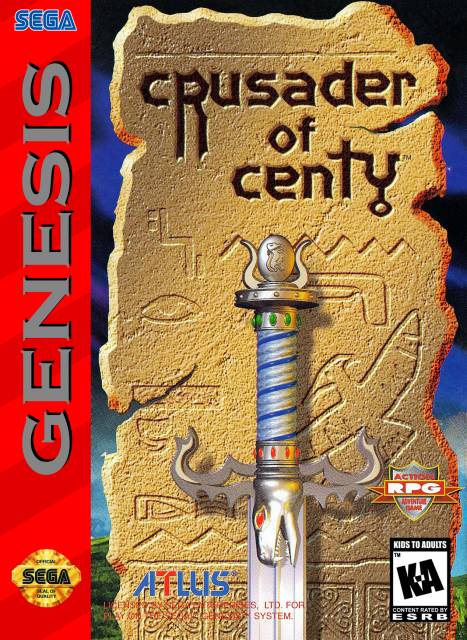
Welcome to episode two of Mega May Madness, where the stated intent was to look into the best RPGs the Sega Mega Drive/Genesis had to muster in order to prove, if only to myself, that while it lacked the SNES's impressive RPG resume it still had a scene worth celebrating. I say that, except both the games I've covered so far - Light Crusader and now Crusader of Centy (US) / Soleil (EU) - are perhaps better defined as The Legend of Zelda-style action-adventure games that are big on real-time combat and environmental puzzle-solving and light on traditional RPG mechanics like levelling up and character customization. l think part of the reason why this has happened is because I've roughly ordered the games I picked out by their length; both my Light Crusader and Soleil playthroughs clocked in at a svelte 8-10 hours, since neither has much in the way of grinding. However, there might also have been an imperative at the time to minimize comparisons to The Legend of Zelda - after all, those are kinda Nintendo's whole bag, and they've proved to be nothing if not litigious about copycats over the years - and "light action-RPG" was the next most apt descriptor.
Focusing on Soleil now, the game has you assume a player-named young man (the default name is apparently "Corona," which... yikes) who has recently come of age, which in this society means giving 14-year-olds a sword and then apparently letting them wander around the countryside unsupervised. Soleil's going for a slightly subversive storytelling gimmick involving time-travel that I think they picked up from the likes of Illusion of Gaia and Chrono Trigger - the game was a 1995 release, so they had their lion's share of better video game narratives to imitate - in that it originally starts as a hero trying to make a name for themselves in a hostile world of adventure with the help of some animal companions after he learns the ability to talk to them Dr. Dolittle style, and then gradually turns into a jeremiad on these vicious fantasy worlds where monsters and humans are always forced to fight the other due to their natures. I'm not sure the message necessary shines through the iffy localization and shoddy pacing of the game, but the end-game sure was a whole heap of conceptually bizarre nonsense that was in stark contrast to the rest of the game's very standard and episodic approach. I looked to the game's developers for answers, but Nextech strikes me as a mercenary contract developer like TOSE that kinda just makes whatever the client asks for (which in this case was Sega for both Japan and Europe, though it was Atlus that published the game in the States for some reason). I'd also never heard of the game's composer Motokazu Shinoda before today and this looks to be his only notable game credit: like Illusion of Gaia's similarly one-and-done musical maestro Yasuhiro Kawasaki, Shinoda had some real talent on display here for memorable BGM themes and it's a shame he didn't go on to work on more games.

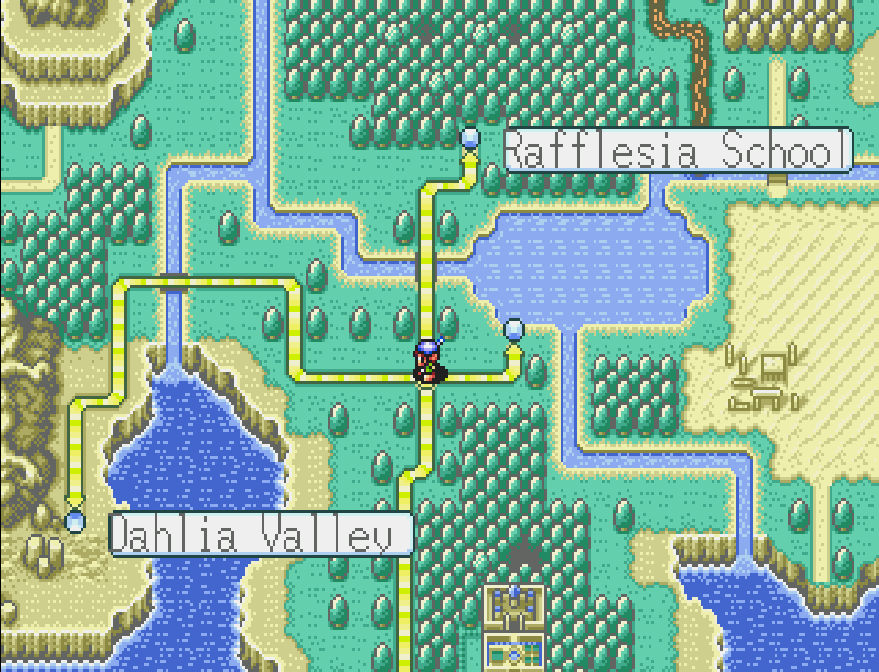
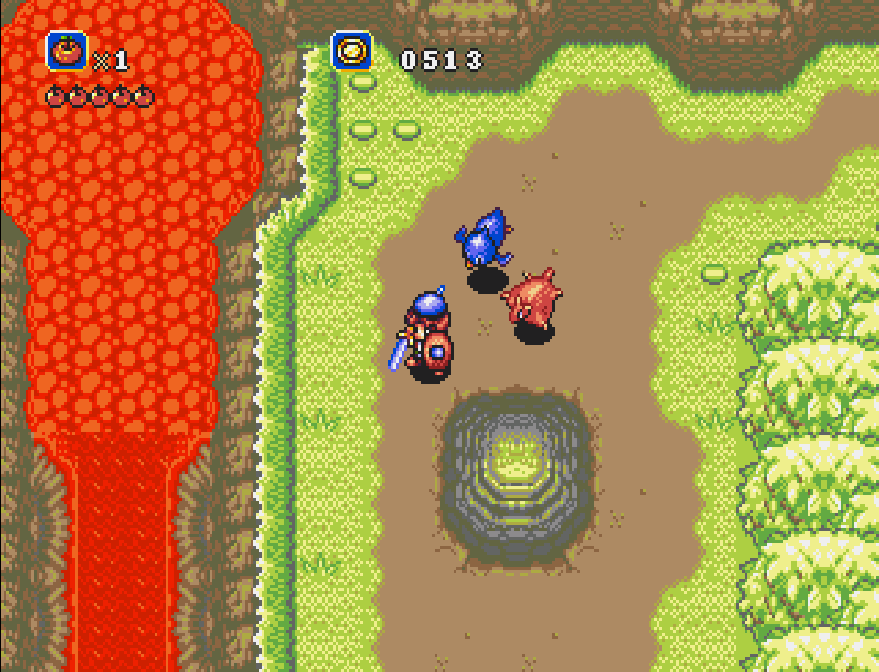
While it's fair to say that the story is all over the place - and I'll demonstrate how a little later with a spoiler-blocked section - both Soleil's gameplay and presentation are, conversely, top-notch. Soleil's hero uses a combination of abilities he learns from the animals he befriends - a hare teaches him the secret to jumping, which turns out to be something the hero could do all along but lacked the courage to do so - as well as abilities provided by the animal companions themselves, which are equipped two-at-a-time much like the items in a Zelda game. One animal companion, a cheetah named Flash, vastly increases walking speed when equipped which turns out to be essential for crossing large gaps with your now-accelerated jumps; another, an armadillo named Rio, will let you throw his balled-up form onto hazardous terrain as a stepping stone or onto buttons trapped behind walls. About half of the animals are doled out as the plot demands and offer traversal skills necessary for further progress, while others are one-offs that need to be hired for cash beforehand: the most valuable, Kitty, acts as a fairy and fully heals you if you run out of health. Some even provide bonus effects when equipped together: for instance, a lion named Inferno blesses your attacks with the fire element for additional damage against some enemies, while a penguin named Chilly does the same thing with ice, and when combined they produce a very powerful damage enhancement. There's a bit of experimentation involved with these synergies though the game will helpfully surface any combination effects in the animal equip screen. Even outside of this system, the protagonist eventually learns how to jump, throw his sword like a boomerang, and lift objects; all of which find many applications in the game's puzzle-heavy dungeons. Despite the breadth of options it's all very intuitive and the puzzles are never all that demanding of your reflexes or perspicacity, though if the game progression has its issues it's usually in knowing what you're supposed to be doing next; something many 16-bit games with mediocre localizations run afoul of if they're not hopelessly linear.
Soleil is also a little more difficult than you might expect from these wholesome-looking screenshots. You do have a generous health supply - measured in apples, since hearts would be too on the nose - and the aforementioned emergency cat if you run out, but health can be a fairly rare drop in most instances and you're sometimes best served going back to town to one of the few places where you can rest up if you're getting too battered (though it's worth noting that the many health upgrades, gained after boss fights and after finding the semi-precious golden apple collectibles, heal you back to full also). Dying for real, with no cat around to save you, boots you back to the title screen and to wherever you last manually saved the game. The game is at least accommodating with the manual saves - you can save anywhere, though in practice that means being dropped off at the start of the current area with whatever progress you had - though as there's no "restart the dungeon/boss fight" option or any manner of auto-save it's something you must to remember to do frequently. Fortunately, the bosses themselves are easy enough to defeat once you've figured out how to hurt them; even more so if you remember to use the companions that enhance your damage output. More likely a death will come from trying to navigate a field of spikes or getting worn down by random monsters in the field.
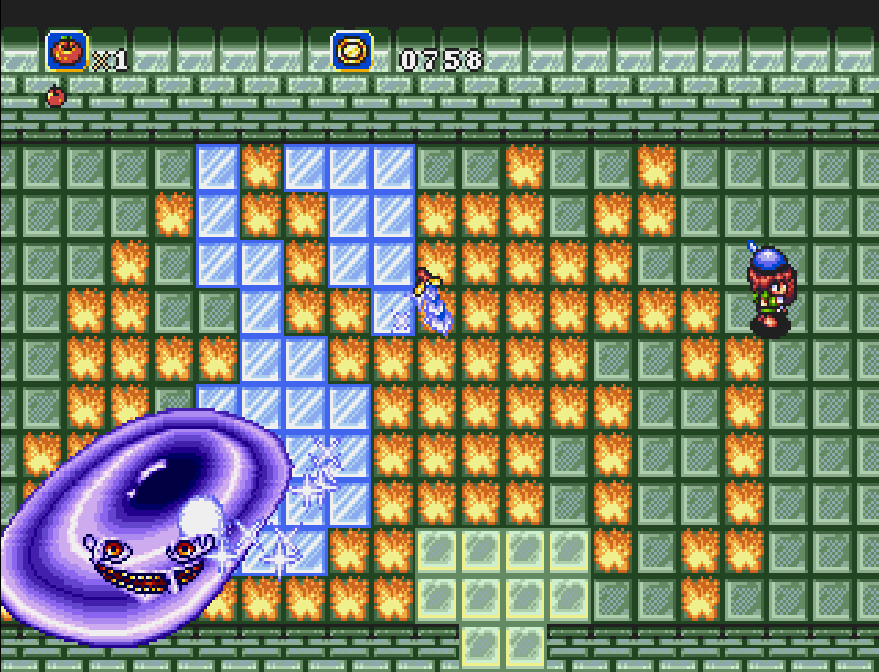
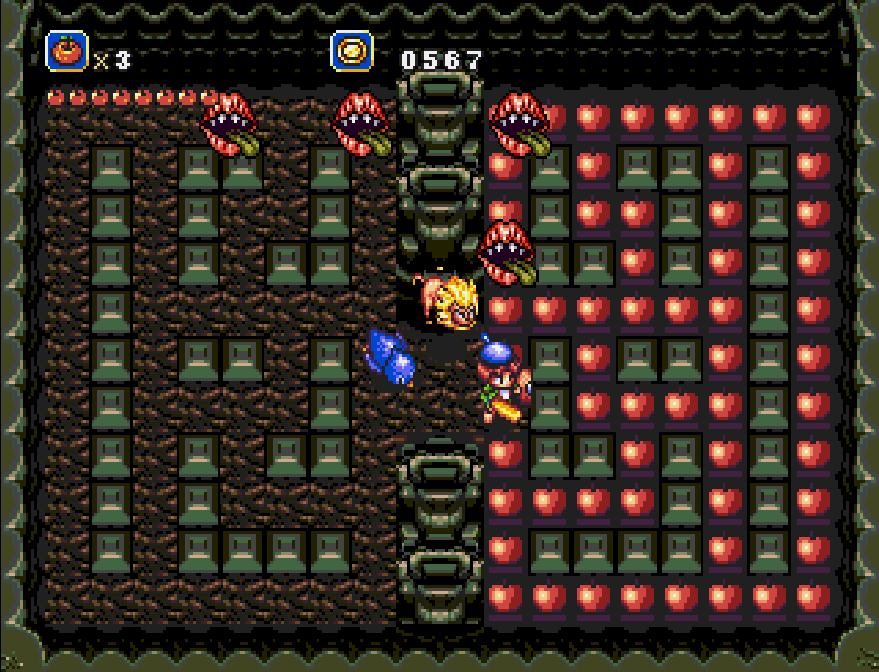
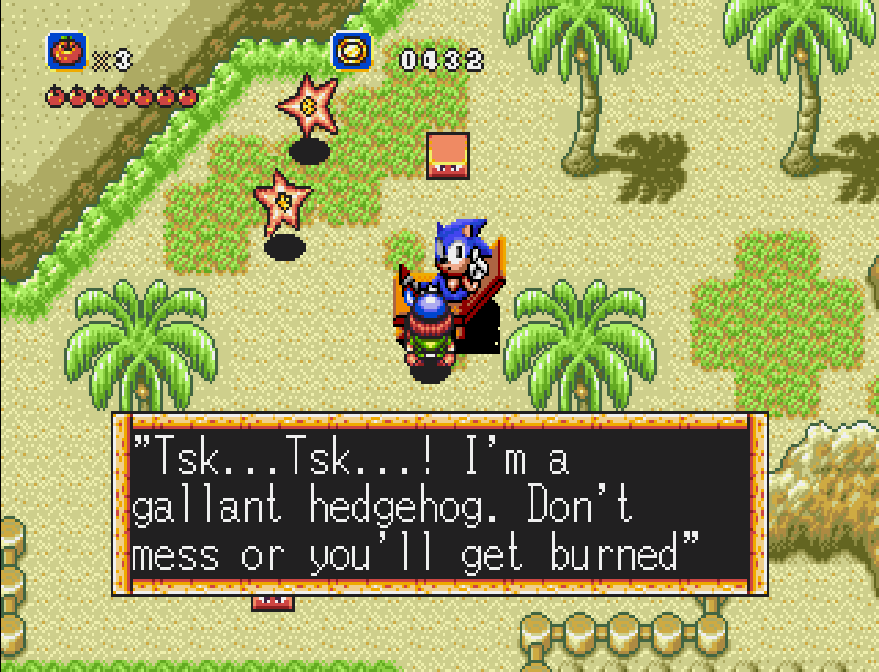
Unusual for games of this genre, Soleil uses a world map for traversal between areas. This is often due to how field zones and dungeons alike have circuitous routes from one side to the other, and once an area has been completed you can conveniently skip over it while navigating the world map. There's an animal that will help you cross over expanses of water too, which lets you easily backtrack to the earlier parts of the game. This is essential for two reasons: the game's non-linear progression often has you revisiting early areas for story reasons, especially the titular town of Soleil where most of the game's NPCs are found, and the other reason being that many of the useful golden apple health upgrades and bags of money needed for hiring animal friends tend to be unreachable until you have the right abilities/companions acquired later. This stage-based format works best for Soleil as there's often little reason to backtrack to some areas once all its valuables have been found, though if you do need to return for whatever reason - be it to collect items or because the story wants to visit it again - the world map ensures it's always accessible, and conveniently lets you return to the zone from either its original entrance or exit. That said, a few regions undergo big changes once its boss has been defeated, and that can make a few collectibles vanish forever (and thus be missable).
All right, so let's make sense of that story:
In some respects Soleil shoots for the moon and misses completely, but when it's just being a video game where you run around hitting monsters and solving puzzles it's a great deal of fun. Certainly it can be a little repetitive, and more than a little obtuse with regards to where you're supposed to go next at any given moment, but it's a successful attempt at imitating the strengths of A Link to the Past with enough to distinguish itself that it doesn't just feel like an inferior copy for the sake of giving its non-Nintendo audiences a "we have Zelda at home," which is how I perceive something like Hudson's Neutopia franchise. Both it and fellow Mega Drive Zelda acolyte Story of Thor / Beyond Oasis considered ways they could improve on the formula or provide a different approach to puzzles (both games involve a lot of summoned beings, oddly) and have distinct visual styles and presentational chops to call their own. Neither is to the caliber of A Link to the Past, it might go without saying, but are very much worthy to breathe the same air at least. I've heard that finding physical copies of Crusader of Centy is nigh-impossible (I have one of Soleil, but it might be far less rare) so I hope it finds its way onto a digital marketplace sooner rather than later, because the gameplay and presentation are remarkably nuanced and high-quality and the story - as fractured and inadequately localized as it is - almost has to be seen to be believed.
Rating: 4 Ristars out of 5.
Log in to comment